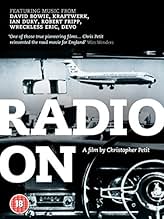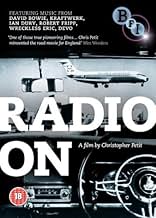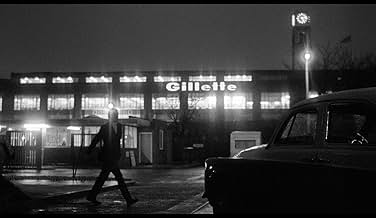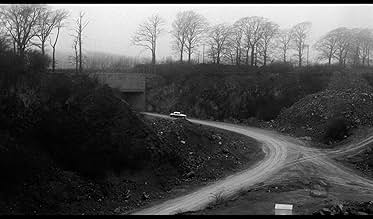Radio On
- 1979
- 1h 44min
VALUTAZIONE IMDb
6,5/10
1226
LA TUA VALUTAZIONE
Aggiungi una trama nella tua linguaIn 1970s Britain, a man drives from London to Bristol to investigate his brother's death, and the purpose of his trip is offset by his encounters with a series of odd people.In 1970s Britain, a man drives from London to Bristol to investigate his brother's death, and the purpose of his trip is offset by his encounters with a series of odd people.In 1970s Britain, a man drives from London to Bristol to investigate his brother's death, and the purpose of his trip is offset by his encounters with a series of odd people.
- Premi
- 1 vittoria e 1 candidatura
Trama
Lo sapevi?
- QuizIn Britain, this film had a limited release on the art-house circuit in 1980 in a double-bill with a famous film made half-a-century earlier, Luis Bunuel's "L'Age D'Or", which had only recently come off the censor's banned list. One critic remarked that this double-billing meant that he had had both his best and his worst cinema-going experience of 1980 on the same evening.
- ConnessioniFeatured in Radio On Remix (1998)
Recensione in evidenza
Former Time Out critic, Christopher Petit's directorial debut, Radio On, shows its European credentials well. I say this for a couple of reasons. For one, like the French New Wave participants, Petit began as a film critic, and the sparing nature of this existential road movie, was self- consciously attempting to move British cinema towards a European style. Secondly, and far more telling, is the influence and participation of the New German Cinema of the 1970's. Whilst interviewing Wim Wenders, the subject of Petit's own screenplay arose, and Wenders was impressed. Therefore, Wenders became associate producer, and also lent the use of his cinematographer, Martin Schafer.
Beautifully shot in monochrome, the black and white imagery displays its artful intentions. We follow Robert (David Beames) as he drives from London to Bristol, after being informed that his brother has committed suicide. On his journey, he encounters several unhinged British citizens, including a Glaswegian squaddie with anger management issues, as well as meeting Sting at a petrol station, who seems to be obsessed with Eddie Cochran. Not much really happens in the film, but the most significant (at least the longest) "relationship" is with a German woman, Ingrid (Lisa Kreuzer - who was in Wenders' Alice in the Cities (1974 - Review #96)), who is searching for her missing daughter named Alice (a possible reference to the aforementioned German film.
This is a bleak representation of 1970's Britain. Not a hard task in itself (you could have pointed a camera anywhere in '70's Britain, and it would have been depressing). But what was fundamental to Petit's intentions, was actually a comment on the decline of British cinema. The main output of British cinema was within the prurient genre of the repressed "sex comedies" such as the on-going Carry On.. films, or the equally lamentable Confessions... series with Robin Askwith. When there was any serious attempt at British cinema, they were barely seen. Petit, felt that the Americanisation of our cinema's and the fact that our national cinema was laughable, was decreasing our cultural identity. Radio On is an attempt to move our cinema towards a more European, existential path, and with a more political consciousness.
www.the-wrath-of-blog.blogspot.com
Beautifully shot in monochrome, the black and white imagery displays its artful intentions. We follow Robert (David Beames) as he drives from London to Bristol, after being informed that his brother has committed suicide. On his journey, he encounters several unhinged British citizens, including a Glaswegian squaddie with anger management issues, as well as meeting Sting at a petrol station, who seems to be obsessed with Eddie Cochran. Not much really happens in the film, but the most significant (at least the longest) "relationship" is with a German woman, Ingrid (Lisa Kreuzer - who was in Wenders' Alice in the Cities (1974 - Review #96)), who is searching for her missing daughter named Alice (a possible reference to the aforementioned German film.
This is a bleak representation of 1970's Britain. Not a hard task in itself (you could have pointed a camera anywhere in '70's Britain, and it would have been depressing). But what was fundamental to Petit's intentions, was actually a comment on the decline of British cinema. The main output of British cinema was within the prurient genre of the repressed "sex comedies" such as the on-going Carry On.. films, or the equally lamentable Confessions... series with Robin Askwith. When there was any serious attempt at British cinema, they were barely seen. Petit, felt that the Americanisation of our cinema's and the fact that our national cinema was laughable, was decreasing our cultural identity. Radio On is an attempt to move our cinema towards a more European, existential path, and with a more political consciousness.
www.the-wrath-of-blog.blogspot.com
- tomgillespie2002
- 21 ago 2012
- Permalink
I più visti
Accedi per valutare e creare un elenco di titoli salvati per ottenere consigli personalizzati
- How long is Radio On?Powered by Alexa
Dettagli
- Data di uscita
- Paesi di origine
- Lingue
- Celebre anche come
- Radio on
- Luoghi delle riprese
- M4, Londra, Inghilterra, Regno Unito(6 High-rise Flats on Green Dragon Lane)
- Aziende produttrici
- Vedi altri crediti dell’azienda su IMDbPro
- Tempo di esecuzione1 ora 44 minuti
- Colore
- Mix di suoni
- Proporzioni
- 1.85 : 1
Contribuisci a questa pagina
Suggerisci una modifica o aggiungi i contenuti mancanti
























